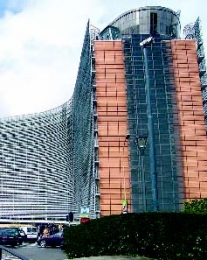“I speak English, Irish, French, Spanish, Portuguese, Italian, German, Greek, Romanian, and Hungarian – and there’s Latin there from my schooldays,” explains Michael McAlinden, before deadpanning: “but that’s about it.”
McAlinden, originally from Rostrevor in Co Down, has been a translator with the European Commission since 1992. He translates a wide range of documents and speeches into English, and says a typical week is “hard to describe”.
The European Commission has three English language translation units – one in Luxembourg, two in Brussels – and is currently facing a shortage of translators, with interpreters also growing thinner on the ground.
The Rostrevor man’s interest in languages goes back to childhood, when he would spend the summers in the Donegal Gaeltacht. At secondary school, he picked up French, Latin and Spanish, and subsequently went on to study Spanish and Portuguese at Queen’s University in Belfast.
He then took a much-sought path, travelling around Spain, Portugal and South America during the early 1970s, teaching English.
“A bit of travelling around, a bit of enjoying myself and not settling down like my father would have liked me to,” jokes McAlinden. “I came back and did special postgraduate training in London in translation and I got a job in British Steel, in their head office working as a translator. That was ’78, a long time ago!”
Native English speakers proficient in foreign tongues tend to concentrate on western European languages, but McAlinden has branched out significantly, counting Hungar-ian and Romanian among his linguistic repertoire. The latter was more difficult to learn than he had expected, he recalls.
“I had the other Romance languages, like French, Span-ish, Italian and Portuguese, so I thought that Romanian would be an add-on to that, and wouldn’t be that difficult to learn with the others under my belt. But it’s quite different in many ways. There’s a lot of Slav influence in it and the grammar is very different.”
Working as a translator with the European Commission since 1992, McAlinden has also had the opportunity to avail of supports within the translation section, which encourages further language learning as part of the job.
“We’re in a good position, we can learn a lot of languages during work time, and we’ve special teachers who come in,” he explains. “At various stages in learning a language you are entitled to take courses in the country, which is important.”
Luxembourg-based McAlin-den enjoys the work, and says that a natural curiosity and ability to cross-check on one’s own initiative are important.
“It’s very strict, we revise a lot of work, and anyone who is relatively new will have all their work revised,” he says.
Generally, native speakers of a language translate into that same language, but non-native speakers can seek to have their level assessed, if they think it equates to that of their mother tongue. Native English speakers who have Lithuanian or Latvian, for example, are in especially short supply, notes McAlinden.
“They are difficult languages in themselves for a start, they are hard to learn and so on,” he says. “And there aren’t that many native English speakers who have them.
“One pond we can fish in is there are Lithuanian and Latvian communities in Australia, people who have grown up speaking Lithuanian and Latvian at home but when you hear them speaking, well, they’re Australians. That’s one area where we’ve managed to recruit a few people, and they then take Lithuanian or Latvian citizenship and can work here.
“We have a colleague who’s half-Hungarian, half-English and he is completely bilingual. And another colleague who is Latvian and has mother-tongue standard English.”
All in all, working as a translator for the European Commission seems to be nice work, if you can get it.
“It’s a kind of civil service job, there is a security. And the pay is very good,” says McAlinden. “The pay is as good as any linguist will get anywhere in the world. Here, people start off with a salary of €40,000 in their hand.”
The people make it worthwhile, too, he adds – with so many different nationalities along the corridor.
– Catherine Reilly












